- Home
- Mark Pryor
The Paris Librarian Page 2
The Paris Librarian Read online
Page 2
“So tell me why you’re here, and for how long,” he said.
She released his hand and sat back. “I’m really just tagging along with Miki. She’s a journalist and wants to write about the movie star Isabelle Severin. She lives here, and apparently her papers are now available at some local library. She’s a little obsessed, seems to think Severin was a spy during the war.”
“A spy for whom?” Hugo knew that the 1940s actress, now in her late nineties, lived somewhere in Paris, after having moved here in the 1970s when she upped and left Hollywood, ending her career on a high note and on her own terms. She’d never attended any embassy events despite numerous invitations, but Hugo’s boss, Ambassador J. Bradford Taylor, claimed to know her, a little anyway. She’s still beautiful, Hugo, I promise you. The sweetest, kindest, and most elegant woman I’ve ever met, he’d said. And something of a recluse, Taylor acknowledged, attended to by one or two close friends and a carefully vetted and fiercely loyal personal assistant.
“For the Allies,” Merlyn said. “Her theory is that she used her stardom to buddy up with top people in the Vichy government, then passed on secrets to the Americans, British, and even the Resistance.”
“You know, I may have read about that somewhere, many years ago.”
“There’s even a dagger involved.”
“How so?” Hugo asked.
“The story goes that she was delivering secrets to a Resistance cell in 1944 and two Gestapo officers showed up. She pretended to seduce one and used his own dagger to kill him.”
“That so?”
“Yeah, well.” Merlyn rolled her eyes. “It’s on the Internet, so I assume it’s true.”
“So what happened to the other officer?”
“No idea. I suppose the Resistance fighters killed him but you’d have to ask Miki, she knows all the gory details.”
“I will. So where is this dagger and stash of papers?” Hugo had a pretty good idea, and he made a mental note to call Paul Rogers.
“No clue.” She grinned. “Like I said, I’m just tagging along so I can see you.”
“I’m glad you did.” Hugo hesitated. “You said Miki was your partner. I wasn’t sure if you meant in business or . . .”
Merlyn waved a hand. “It’s complicated. We’re good friends but . . . It’s complicated, but mostly in a good way.”
“Yeah, well, watch out for Tom. He likes complicated, and he especially likes innocent-seeming pretty girls from England.”
“You know I can look out for myself,” she said with a wink. “And don’t call me innocent.”
“I said innocent-seeming. And I know you can look out for yourself, just look out for Miki, too.”
Merlyn chuckled. “That girl can handle herself, don’t worry. Last night Tom came on a little strong and she shut him down lickety-split.”
“That’s good to know. So who is she writing this article for?”
“Freelance. She thinks it might even be a book. As well as the mysterious dagger, she’s convinced there is a bunch of Severin’s stuff that’s never been seen before and that puts some people in a bad light. Politicians who are now dead, and a few old movie stars, but still. Those people have families and estates to worry about, which means it’ll be controversial.”
“. . . And therefore will sell.”
“Precisely,” Merlyn said. “Assuming all that stuff exists and she can get her hands on it.”
“Some grand conspiracy to hide the truth, eh?” Hugo said.
“Yeah, well, don’t be sarcastic with her,” Merlyn chided. “She’ll stab you with her pen.”
“Maybe I can help. I’m headed to the American Library tomorrow to look at some books they’re selling. I’ll ask my contact there; he’d know the whereabouts and extent of the collection.”
“But will he tell you if there’s secret stuff? Miki’s made several calls, had important people pull all kind of strings, and the best she’s got is, basically, ‘Come have a look, we’ll let you see what we’ll let you see.’”
Hugo spread his hands. “I can ask. Isabelle Severin is still alive, and living here in Paris. You guys should try to talk to her.”
Merlyn raised a delicate eyebrow. “Bloody hell, Hugo, what a great idea, she’d never have thought of that. You don’t have a high opinion of journalists, do you?”
“Ah, you tried already. Sorry.”
“Miki can’t even get close to her. Apparently she doesn’t like a lot of attention and her former personal assistant was a little, shall we say, tight-lipped. You know anyone close to her?”
“She and I don’t move in the same circles,” Hugo said. “Although my boss claims to know her a little. I can ask him, but no promises.”
They sat quietly for a minute, watching the morning activity of the café, then Merlyn said, “We may be going to a party tonight, you wanna chaperone us?”
Hugo’s mind flashed to the last party he went to with Merlyn, an underground, highly secretive BDSM event where he’d found an important clue in the case he was working on.
“What kind of party?” he asked suspiciously.
“Same as last time,” she said lightly. “But French. Strict dress code, of course, but I can help you with that.”
Hugo smiled and shook his head in mock disgust. At the party in England, she’d told him that he would be allowed in only if he was wearing leather, the party’s dress code. She forgot to mention that a tuxedo was also permitted—a rule he would have followed quite happily, and one he discovered once he was already inside the party dungeon. One of those things, he thought, that’s a lot funnier in hindsight than at the time.
“I’ll pass,” he said. “Feel free to take Tom, he may actually enjoy it.”
“Scaredy cat.”
They looked up as Miki and Tom rejoined them. Miki poked at her coffee and frowned. “That went cold fast,” she said. She looked up at Hugo. “Merlyn said you’re head of security at the US Embassy here.”
“That’s right,” Hugo said.
“What does that mean, exactly? What do you actually do?”
“That depends on the day, the week. It varies a lot. Sometimes I’ll escort guests, sometimes I’ll arrange security for dignitaries, sometimes I’ll work with local police when there’s been a crime involving an American citizen.”
“Do you carry a gun?”
“Whether or not RSOs carry weapons is decided by the two countries involved, so that also varies from embassy to embassy.”
“I was asking about you,” Miki pressed.
“I know you were.” Hugo smiled. “Tell me about your writing project. Merlyn said you’re writing an article about Isabelle Severin.”
“I’m actually hoping it’ll be a book. Amazing person. She wasn’t just the most beautiful woman who ever lived, she was a good person, too.”
“And brave, if she was a spy.”
Miki watched him, as if wondering whether he was making fun of her. “Merlyn told you about that.”
“I think I already knew about the rumors but yes, she said you were looking into whether or not that was true.”
“I’m pretty sure it is, but she doesn’t want anyone to know.”
“So shouldn’t it stay a secret?”
Miki smiled. “Merlyn said you were kind of a Boy Scout.”
“Meaning?”
“Meaning, if one of the most famous actresses of the last century went up against, and defeated, the Gestapo, that should be public knowledge, especially seventy years later. What’s the harm?”
“Maybe that’s for her to decide.”
Miki’s voice hardened. “I’ve never known a historian or journalist to ask permission from their subject, so I’d say no, it’s not.”
“I’m with you on that,” Tom interjected. “But aren’t there books about her already?”
“One or two, but nothing published recently.” Miki nodded. “But they barely touch on her travels, and whatever else she got up to in France. Since her papers ha
ve just been donated to the American Library here, I’m hoping there’s something new and different I can share with the world about her role in the war.”
“You’re sure she had a role?” Hugo asked.
“Yes. At least, I think so.” She flashed a smile. “If I get to see all her papers, I’ll find out.”
“Seems like a tough story to dig up.”
“I like a challenge,” she said. “And once I get my teeth into something like this I don’t give up until I get the truth, all of the truth. If there’s a story there, I’ll get it one way or another.”
“Very admirable. You know what, let me call my friend at the library right now.” Hugo stood. “A little noisy in here, I’ll be right back.” He walked out of the café and found a shaded spot on the sidewalk. He dialed Paul Rogers, who answered quickly. “Paul, Hugo Marston again. Hope this is a good time.”
“Change your mind about the book?”
“Not at all. It’s about a new collection you guys have. Isabelle Severin’s papers.”
“Ah, yes, I’m in charge of those, as it happens. What do you want to know?”
“I have a friend here, she’s planning to write a book about Severin. She seems to think the actress was involved in the war, some kind of spy or something.”
Rogers didn’t reply immediately. “Well, I’ve not gone through everything yet, a lot of it still needs to be catalogued. But I haven’t seen anything along those lines.”
“You don’t sound terribly sure.”
“She was definitely an interesting woman, so it’s not impossible. But like I said, I’ve not been through everything yet. There’s a ton of stuff on the Internet which might interest you, and we have one or two books in the library about her life, too.”
“I may check those out.”
“Not anymore, if you meant that literally. We’ve moved them into the collection, keeping everything related to her together in one place. You’re welcome to come by and look at it, just not check anything out.”
“Including the secret stuff?”
“Again, nice try. I’m just sorry I can’t tell you more.”
“I understand. I wouldn’t ask you to compromise yourself, don’t worry. Although maybe we can talk more tomorrow morning, I’m quite curious now.”
Rogers chuckled. “Of course you are—that’s your nature. I don’t think I’ll be able to tell you much more, but sure, we can talk. Oh, do me a favor and come around eleven will you?”
“Sure thing.”
“Another secret, but this one I can tell you. I’m writing a book.”
“You are? That’s great, and seems appropriate for a librarian.”
“I’ve always wanted to, and I’m not getting any younger. I decided I just need to go for it, make myself do it. So every morning I shut myself in a spot in the basement that I’ve converted into a writing room, lock the door, and don’t let myself out until I’ve written two thousand words.”
“How long does that take you?”
“Well, I do my research at home the evening before—the Wi-Fi reception in the little room where I write is worse than useless. But that way I’m primed and ready to go the next morning, so anywhere from one to three hours, depending on my mood, inspiration, and work distractions. I try to start around eight or nine, finish by eleven.”
“What are you writing?”
“It’s kind of a science fiction crime thriller. Takes place in the future, and also the past. Time-travel stuff. Sounds silly, I know, but . . . there you have it.”
“I think it’s fantastic, actually,” Hugo said. “I couldn’t ever write a novel, so I admire anyone who can, regardless of subject matter.”
“It remains to be seen whether I can finish it.” Rogers laughed. “But so far so good.”
“Well, best of luck with it; I’m impressed.” Hugo turned as Tom, Merlyn, and Miki stepped out of the café. “I better get going. I’ll see you tomorrow around eleven?”
“You bet.”
Tom and Hugo walked slowly behind Merlyn and Miki, who linked arms and took in everything around them.
“That your buddy at the library?” Tom asked. “Bald guy in his forties, with the super-hot American wife in her twenties?”
“Fiancée, I think, or just girlfriend. But yes, that’d be him. Paul Rogers.”
Tom wagged a finger. “He’s one of those guys who’s way more interesting than he appears. Like your buddy Max, the bouquiniste.”
“Oh, I know, I vetted him for embassy-related reasons.” Hugo thought of Max often, the gruff, grumpy, but painfully honest bookseller who’d been kidnapped from his stall beside the Seine. For a while, Hugo was the only one looking for Max, and in the process he had discovered the man’s fascinating history as a Nazi hunter, something Hugo had no idea about. It was another lesson that you never really knew about people, only what they wanted you to see. Unless, like Hugo or Tom, you were very good at discovering people’s pasts, digging up their secrets.
“Yeah, adopted by a rich but kooky French lady. She shipped him off to America to live with relatives, go to boarding schools on the East Coast. He grew up an American, only came here for the occasional vacation until about twenty years ago.”
“How do you know all this?”
Tom nudged him playfully. “Guess.”
Hugo thought for a moment. The two men had been best friends ever since they met at the FBI Academy in Quantico, living and working together over the years. Their paths had split when they left the FBI and Tom got recruited to work for the CIA, a move that suited his reckless side. But that last year at the bureau and the rigors and expectations of his new job had changed his friend. He drank too much and was prone to fighting in bars several times a year, a trait that was manageable except that Tom usually picked on people much larger than him. And, occasionally, cops. An interest in librarians like Paul Rogers was definitely not going to be recreational, even if the man had a beautiful girlfriend.
“I would say,” Hugo began, “that since he’s a dual citizen and gets to live in either country . . . and has a wealthy, presumably high-society mother, he came across your radar at the CIA as either a potential asset or a possible target.”
Tom slapped Hugo on the back. “Smart man. Both, as it happens.”
“Both?”
“He was zipping back and forth a lot as a kid. Some people at the Company have this phobia about sleepers, children raised in the US and groomed to be spies. There have been a few, but there were also a few dinosaurs in the past, if you know what I mean. As with dinosaurs, TV and movies keep the threat alive, so when baldy Rogers attracted attention he, well, attracted attention. Although he wasn’t bald back then.”
“How very interesting,” Hugo said. “You guys have your beaks everywhere, don’t you?”
“Some places you wouldn’t much like, my friend. Anyway, that’s not all of it.”
“Keep going.”
“He had a brother, a few years older. He wouldn’t even remember him, because Rogers was not even two when he was adopted, this other kid was seventeen. Real kid, the old woman’s flesh and blood, not adopted.”
“This’ll surprise you, Tom, but adopted kids are real kids, too.”
“You know what I mean. Anyway, this brother, Michel, or something. Quite the handful. Into drugs, women, not going to school. Angry little man whose fist put him in contact with the juvenile justice system here. To hear the mother tell it, he had this girlfriend and both sets of parents were against it. She was black, he was lily-white, and no one approved. One fine day he and this girlfriend eloped, drove up to the Normandy coast and . . . that was that.”
“They married and lived happily ever after?”
“Quite the opposite. Drove their car off a cliff into the ocean, holding hands all the way down.”
“Seriously? They found them like that?”
“No, silly, they only found part of one of her legs and deduced the rest from the carnage. And a motorist saw the car g
o over the edge. It might have been an accident, but given that his mother had threatened to cut him off, well, there was also talk of a double suicide.”
Hugo shook his head. “Crazy story. Does Paul know all this?”
“Dunno. You can ask him next time you see him.”
CHAPTER THREE
On Monday morning Hugo worked from the dining table in his living room so he could enjoy the sun streaming through the main windows, which he opened just enough to allow in the sounds of a waking Paris. He made three pots of coffee, all of which were awful, and resisted the temptation to grab a book and enjoy a quiet, and decent, café crème in one of the nearby cafés.
At ten thirty Tom emerged from the spare room, rubbing his head and grousing about the sludge in the coffee pot.
“You’re a man of many talents, Hugo,” he said.
“Yeah, I know, making coffee isn’t one of them.”
“You need a wife. What’s going on with Claudia and you?”
“I think they call it casual dating,” Hugo said. “It’s fine, we’re both happy.”
“Sure you are. Has she met Merlyn yet?” An edge in Tom’s voice suggested there was more to the question than just the words.
“You know she hasn’t; Merlyn just got here. And Merlyn’s my friend, Tom, nothing more. She’s just a kid.”

 The Book Artist
The Book Artist The French Widow
The French Widow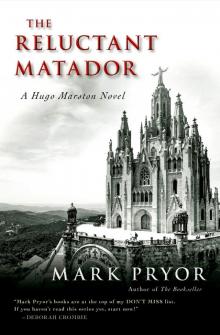 Hugo Marston 04 - The Reluctant Matador
Hugo Marston 04 - The Reluctant Matador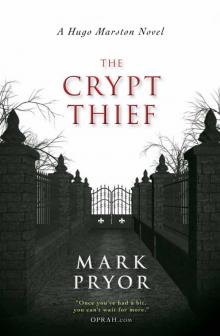 The Crypt Thief
The Crypt Thief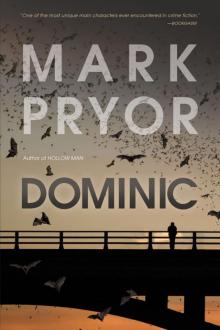 Dominic
Dominic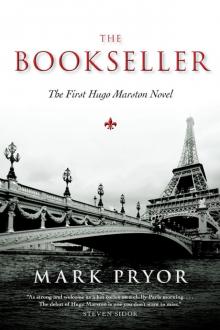 The Bookseller
The Bookseller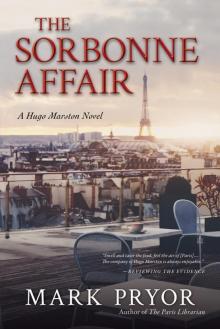 The Sorbonne Affair
The Sorbonne Affair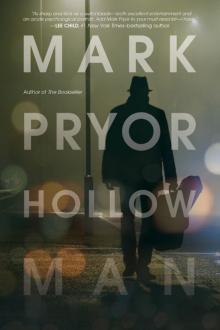 Hollow Man
Hollow Man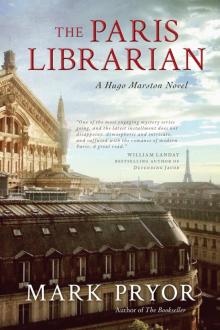 The Paris Librarian
The Paris Librarian